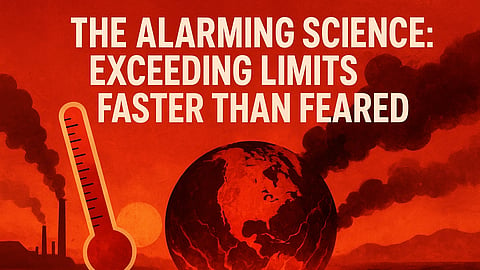Beyond 1.5°C: Navigating the Inevitable Tipping Points of Global Warming in a Post-Paris World
The Alarming Science: Exceeding Limits Faster Than Feared
In the sweltering heat of 2025, global temperatures have etched a grim milestone into history. The UN Environment Programme's (UNEP) Emissions Gap Report 2025: Off Target, released just weeks before COP30, paints a stark picture: even if nations fully implement their updated Nationally Determined Contributions (NDCs), the world is locked into 2.3–2.5°C of warming by 2100, with current policies pushing it to 2.8°C.
This is a marginal improvement from last year's 2.6–2.8°C forecast, but methodological tweaks and the U.S. withdrawal from the Paris Agreement erase much of the progress—new pledges alone shave off just 0.1°C.
A World on the Boil: New FAO–WMO Report Warns Extreme Heat Is Endangering Global Agriculture
Worse, the multi-decadal average temperature will likely surpass 1.5°C within the next decade, triggering what scientists call "tipping points"—thresholds where Earth's systems flip into self-reinforcing decline.
The Global Tipping Points Report 2025, synthesized by 160 researchers and unveiled ahead of COP30, declares we've already crossed the first: widespread die-off of warm-water coral reefs. These ecosystems, vital for a quarter of marine life and nearly a billion people's livelihoods, are succumbing to repeated bleaching events as ocean heatwaves intensify.
Antarctic ice sheets are next in line. The West Antarctic Ice Sheet, already destabilized, could collapse at 1.5–2°C, unleashing meters of sea-level rise and flooding coastal cities from Miami to Mumbai.
Permafrost thaw in the Arctic, holding twice the carbon currently in the atmosphere, is accelerating, releasing methane—a greenhouse gas 80 times more potent than CO2—and turning carbon sinks into emitters. These aren't distant threats; 2025's record heat has amplified them, with boreal forests shifting from absorbers to amplifiers of warming.
Sustainability Under Siege: Carbon Emissions' Vicious Feedback Loops
Global warming's tipping points aren't isolated; they form a web of feedbacks that supercharge carbon emissions and erode sustainability. Coral collapse disrupts fisheries, threatening food security for 500 million people and slashing $36 billion in annual economic value.
Thawing permafrost could release 1.5 gigatons of carbon yearly by 2100—equivalent to half of current global emissions—while Antarctic melt alters ocean currents, potentially cooling Europe but devastating global agriculture.
The economic toll is staggering. The Lancet Countdown 2025 reports that heat exposure alone erased 640 billion labor hours in 2024, costing $1.09 trillion in lost productivity—disproportionately hitting low-wage sectors like agriculture and construction in the Global South.
In India, a single extreme heat day claims 3,400 lives and billions in output; scaled globally, these events could drain $4.2 trillion annually by 2030. Yet, emissions keep climbing: 2024 saw fossil fuels supply 82% of energy, with deforestation in the Amazon—COP30's very backdrop—reversing Brazil's gains and spewing stored carbon.
Sustainability efforts falter amid these loops. Forests, once buffers, now risk tipping to savannas at 1.5–2°C, releasing 200 gigatons of CO2 and slashing biodiversity. The UNEP report urges a 55% emissions cut from 2019 levels by 2035 to chase 1.5°C—a feat demanding unprecedented decarbonization. Without it, we're not just warming the planet; we're unraveling the threads of human resilience.
Charting a Course: Actionable Pathways from COP30 and Beyond
COP30 in Belém, Brazil—overrunning into November 22 amid fire evacuations and stalled drafts—exposed the chasm between rhetoric and resolve. Over 80 nations pushed for a fossil fuel phase-out roadmap, but the EU rejected watered-down texts, demanding deeper cuts.
UN climate chief Simon Stiell implored: "Move much faster on emissions reductions and resilience." Emerging wins include a Forest Finance Roadmap backed by 36 countries to plug a $66.8 billion gap in tropical protection, and calls to triple adaptation finance by 2025.
Solutions exist within reach. Scaling renewables—now outpacing fossil investments twofold—could peak warming at 1.7°C by 2050, per Climate Analytics, if paired with electrification and efficiency. Direct air capture, though nascent, must remove gigatons to limit overshoot to 0.3°C, buying time for a return to 1.5°C.
Equitable finance is key: Redirecting $1 trillion in annual fossil subsidies to the Global South could fund adaptation, debt-for-nature swaps, and indigenous-led conservation. Policy pivots, like unified emissions tracking, ensure accountability.
Positive tipping points offer hope: Rapid green tech rollout could self-propel change, as seen in solar's 30% cost drop since Paris. Every tenth of a degree averted slashes tipping risks—coral remnants can persist with pollution curbs, permafrost refreeze if cooled.
A Call to Collective Resolve: From Alarm to Agency
As COP30's gavel falls in the Amazon's fragile embrace, the post-Paris era demands we confront tipping points not as fate, but as a clarion for transformation. We've breached 1.5°C's guardrail, but the door to 1.7°C—and a livable planet—remains ajar.
Nations must honor NDCs with trillions in mobilized finance, phase out fossils decisively, and empower the vulnerable. Scientists, from the GTPR's chorus, affirm: Action now minimizes overshoot, averts cascades, and unlocks a resilient future.
The choice is ours. In this overheated world, sustainability isn't a luxury—it's survival. Let COP30's echoes propel us from inertia to ingenuity, ensuring the tipping points we dread become the pivots for renewal. The Earth endures; now, humanity must rise to match it.


